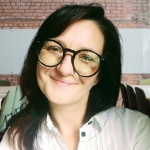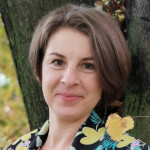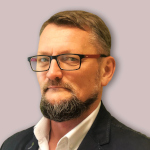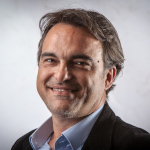Understand Autism
The course is aimed at people interested in the topic of autism spectrum disorders.
The course is aimed at people interested in the topic of autism spectrum disorders.

This course was created as part of the project POWR.03.01.00-00-W010/18 "Course for self-development" co-financed by the European Union under the European Social Fund, Operational Program Knowledge Education Development 2014-2020, Priority Axis III. Higher education for the economy and development, Measure 3.1 Competences in higher education.
The course is aimed at people interested in the topic of autism spectrum disorders. It covers issues related to the diagnosis and development specificity of people with autism spectrum disorders. It will also discuss the issues of therapy and education of children, adolescents and adults with autism spectrum disorders.
The course is aimed at pediatricians, teachers of preschool and early childhood education, educators and teachers at other levels of education, psychologists, therapists, and employees of institutions attended by people with autism. It can also be used by parents who have noticed differences in their child's behavior or have been referred to a clinic to diagnose their child for autism.
You do not need to meet any requirements to join the course.
General objectives of the course
During the course, each participant will be able to obtain knowledge and skills in the field of:
Detailed objectives
Thanks to the participation in the course, the participant will:
The causes of autism and a historical ouline
Early theories on the causes of autism. Contemporary views on the causes of autism - genetic and neurodevelopmental aspects.
Primary symptoms of autism and their impact on overall functioning
Diagnostic criteria according to ICD-10 and DSM - V - diagnostic similarities and differences. Differential diagnosis of autism spectrum disorders and intellectual disability, childhood schizophrenia and delayed speech development.
Diagnosis of autism
Methods used in the diagnosis of autism. The specificity of the diagnosis depending on the age of the diagnosed person.
Developmental specificity of people with autism spectrum disorders, part 1
Skill Profile in Intelligence Tests. Sensory profile of people with autism.
Developmental specificity of people with autism spectrum disorders, part 2
Deficits in theory of mind and executive functions. Central coherence disorders.
Therapies for people with autism
Review of the most popular types of therapy for people with autism - behavioral therapy, Option Method (Son - Rise), Floortime Method. Therapies supporting the development of people with autism - Sensory Integration, music therapy, Knill Method, Developmental Movement Method, Good Start Method.
Difficult behaviors in people with autism spectrum disorders
The causes of the appearance of aggression and self-aggression. Ways to modify aggressive and auto-aggressive behavior.
Teaching a child with autism
Techniques for teaching a person with autism. Deficit areas and ways of supporting development in these areas. Supporting the development of social competences.
Specificity of working with high-functioning individuals
The main difficulties of the high-functioning people. Anxiety and depressive disorders in people on the autistic spectrum. Psychotherapy of people with autism.
Working with parents of children with autism spectrum disorders
Providing information about the diagnosis to parents - practical tips. The specific difficulties faced by parents of people with autism. Types of support parents of an autistic person can receive.
Sexuality of people on the autism spectrum
What is sexuality? What is the purpose of sex education for people with autism? Child's psychosexual development. Child masturbation. Factors disrupting the psychosexual development of children on the autism spectrum. Teenagers on the autism spectrum and sexuality. Sexuality of people with autism and intellectual disabilities. Sexual violence against people on the autism spectrum.
The participant:
After each module, there is a final test (11 tests in total throughout the course) which will be formally assessed, which means that your scoring will reflect your progress in the course. It is only possible to approach the final tests once. The final tests consist of 5 single-choice questions, which means that only one answer is correct.
In all final tests, 1 point will be awarded for the correct answer. The condition for passing the course is to read all the content in individual modules, supported by the completion of all the tests at the end of the modules at the level of 60%.
The condition for receiving the certificate is passing the course at the level of 60%.
The course completion certificate is generated automatically after the participant reaches the passing threshold. The certificate is available in the "My courses" tab and on the last page of the course - after clicking the "Finish course" button.

Eliza Ludkiewicz, MA
Psychologist, oligophrenopedagogue, art therapist
Assistant at the Department of Music Education of the Stanislaw Moniuszko Music Academy in Gdansk. A psychologist with many years of teaching and practical experience. Research interests focus on the neuropsychology of music and the use of art in the therapy of people with disabilities, including autism spectrum disorders.
She gained practical skills in the field of autism, among others, in such institutions as the Special Revalidation and Educational Center for Children and Youth with Autism in Gdansk, Autistic People Aid Association in Gdansk, Primary School for Children with Autism PROMETHEUS in Toruń, Association for Assistance to People with Autism in Toruń. , Association for Persons with Disabilities in Sopot and as part of private psychological practice. As part of her didactic work, she cooperates with universities from all over Poland.
Author of numerous articles and book chapters in the field of developmental psychology and music therapy. Co-author of educational series for children with autism "Me and my world - picture stage", "Me and my world 2 - word stage", "Me and my world 3 - sentence stage" and books with songs and games for children "I thrive while singing”.

Izabela Suchta, MA
Health educator, sociotherapist, certified sex educator, graduate in clinical sexology. A promoter of reliable sex education, accessible to everyone.
She is the founder of Santeriz Therapeutic and Educational Clinic, where she has been working with people on the autism spectrum and their families for more than a dozen years.
She cooperates with educational institutions and conducts lectures for university students.
On a daily basis, she is involved in educational activities, conducting training courses and workshops for parents and specialists.

Dariusz Januszewski, MA
Academic teacher at the Institute of Pedagogy at Humanitas University in Sosnowiec, Poland, and ambassador of the postgraduate program in "Education and therapy of persons with autism spectrum disorders" at Humanitas University.
Special education teacher with over 30 years of experience in working with children with disabilities including autism, intellectual disabilities, blindness and low vision, and multiple disabilities. Early childhood development specialist with fifteen years of experience in working with children on the autism spectrum and their families covered by early support. Expert of the Specialized Center for Supporting Inclusive Education. For many years he has been practicing in the field of supporting the development of children with special educational needs, which he combines with didactic and training work at national universities. Speaker at conferences and webinars. He has gained extensive experience in the area of therapeutic work with children, adolescents and neurodiverse adults. He is actively associated with many NGOs working for the benefit of people with disabilities.

Aleksander Mańka Ph.D.
Special education teacher, therapist, prevention specialist, trainer, assistant professor at Humanitas University in Sosnowiec.
For many years he has been involved in supporting the psychosocial functioning of families, civil partnerships and adolescents. He is the author of many books, publications, preventive and therapeutic programs, which are the result of integrating his experience with academic work.
Contact: autyzm@humanitas.edu.pl